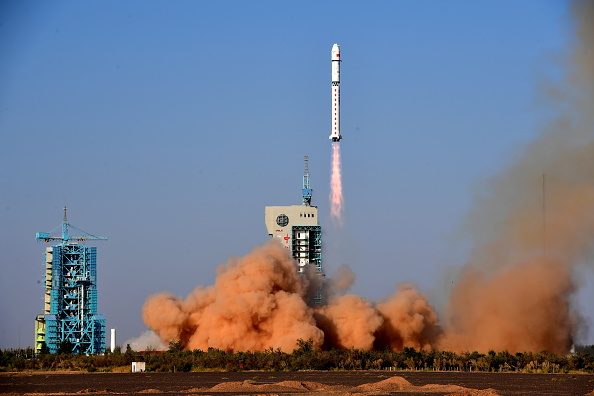
 Birthday Celebrations
Birthday CelebrationsOn October 1st, the People's Republic of China marked 70 years of rule by the Communist Party of China with a military parade and a lot of pomp and circumstance. The event was tightly scripted and flawlessly executed in Beijing, although massive pro-democracy demonstrations in Hong Kong threatened to undermine the message of peaceful and harmonious growth.
In the US, President Trump drew ire from human rights groups and political opponents after cheerfully congratulating President Xi Jinping on the anniversary. Republican lawmakers condemned China's National Day and warned against China's "economic warfare...through currency manipulation and tariffs targeting our farmers." The White House defended Trump's message, saying the President has been harder on China than almost any of his predecessors.
 Economic Stormclouds
Economic StormcloudsIt's been seventy years since the founding of the People's Republic of China, but only forty years since the country started to boost the global economy with a tremendous upsurge in wealth. With the global economy slowing down, and future prospects of growth uncertain, Chinese consumers are increasingly saving their money as they face the prospect of an economic downturn. Far fewer Chinese citizens are traveling domestically or abroad during this year's National Day holiday, as a weaker yuan and slowing income growth takes its toll on consumer confidence.
Meanwhile, the U.S. administration reportedly weighed imposing investment restrictions on Chinese firms, including a possible delisting of Chinese stocks from U.S. stock exchanges. The move would likely further drive Chinese investment from the United States. However, the White House called the allegation "fake news" and Senate Majority Leader Mitch McConnell downplayed the notion, saying that Chinese firms will not be prevented from investing in the American market, and asserting that it would not be in the best interest of the U.S. economy. Nonetheless, a recent report by Rhodium Group found that Chinese venture capital investment into the US has fallen this year to its lowest level since 2015, and overall Chinese investment in the U.S. dropped almost 90% from 2016 ($46 billion) to 2018 ($5 billion).
 Once in a Blue Moon
Once in a Blue MoonThe new space race continues to heat up as China unveiled this week photos of its next-generation spacecraft for human spaceflight that would allow astronauts to travel to the moon, possibly as soon as next year.
The announcement comes a few months after China's Chang'e-4 spacecraft visited the dark side of the moon in January 2019. China announced this week that the landing earlier this year made another form of history: China conducted the first biological growth experiment on the moon, successfully growing lunar cotton plants for the first time, yet failing to produce potatoes or fruit flies.
Meanwhile, an unusual cancer research project received a greenlight for China's Space Station in 2022. The project "Tumors in Space," will examine whether weightlessness can stop cancer from growing, as well as the roles of both microgravity and cosmic radiation in tumor growth and development. The project was the only one selected by the United Nations Office for Outer Space Affairs (UNOOSA) and the China Manned Space Agency (CMSA) to be headed by a woman.
Prepared by China-US Focus editorial teams in Hong Kong and New York, this weekly newsletter offers you snap shots of latest trends and developments emerging from China every week, while adding a dose of historical perspective.
- 2019-09-28 A World Split in Two?
- 2019-09-20 Another Round
- 2019-09-13 Olive Branch or Olive Twig?
- 2019-09-07 The Unwinnable War?
- 2019-08-31 “Sorry, it’s the way I negotiate”
- 2019-08-23 Tit for Tat
- 2019-08-17 Slowdown Ahead?
- 2019-08-09 Yuan on the Rocks
- 2019-08-02 Ratcheting Up the Crisis
- 2019-07-26 Playing Defense
- 2019-07-19 “Stain of the Century”
- 2019-07-12 Whichever Way the Wind Blows
- 2019-07-04 A Gentlemen’s Agreement
- 2019-06-28 A Truce on the Horizon?
- 2019-06-22 Three’s A Crowd
- 2019-06-14 Battle for Hong Kong
- 2019-06-07 Panda Diplomacy
- 2019-05-31 Trade Diversions
- 2019-05-25 Farm Aid or Band Aid?
- 2019-05-17 Risky Business
